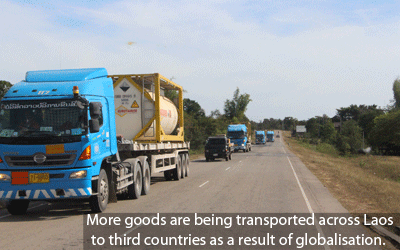Laos: Globalisation provides opportunities and challenges
Globalisation is offering both opportunities and challenges for nations since the world is becoming increasingly interconnected as a result of massively increased trade and cultural exchange.
This was the theme of Prime Minister Thongloun Sisoulith’s statement which he delivered at the 23rd International Conference on the Future of Asia held in Tokyo last week. The conference was held under the theme “Globalism at a crossroads – Asia’s next move”.
The prime minister described globalisation as “an expansion of trade and investment cooperation among nations, and the use of modern technology in enhancing our relationship and cooperation for mutual benefit among countries”.
Globalisation also implies the free movement of goods, capital, services, people, technology and information. Throughout the past decades, globalisation has created a wide range of conditions and opportunities for development and international cooperation.
“Since the 1950s, global trade volume has increased 20 fold while the flow of foreign direct investment had soared exponentially,” Mr Thongloun said.
In Asia in particular, globalisation has quickly spread, broadened and deepened. Countries in Asia, namely China, India and newly emerging economies, have also experienced rapid and sustained economic growth, which has lifted hundreds of millions of people from poverty, thus resulting in a shift in policy formulation covering a wider scope.
In addition, creating enabling environments for enhancing connectivity between countries and across regions, the application of new technology to facilitate intra-regional and international trade and investment including the fast movement of foreign direct investment, has become more vibrant. Most analysts believe that our world is entering a new era of quality development and the 4th Industrial Revolution has become reality.
Mr Thongloun noted that cooperation in the era of globalisation has brought about not only economic benefits but also created an important platform for addressing and resolving regional and global conflicts, thus making an important contribution to the maintenance of peace and security in the region and the world at large.
This is due to the fact that in the era of globalisation, a problem in one country that affects another country in the same region could potentially impact on another region. Such a problem cannot be resolved by a single nation alone whether big or small, rich or poor. It requires a concerted effort by all to address such a problem.
Like other countries, Laos is benefiting from regional economic integration, enabling its economy to grow constantly and generating more job opportunities and revenue for local people.
Despite opportunities, globalisation has also brought about numerous challenges both at the regional and global levels. For instance, a development gap that results in imbalances in the capacity to access and reap benefits from globalisation is inevitable.
Indeed, countries with a larger capacity are better off, which may be one of the factors that can cause conflict.
On the other hand, a number of countries have experienced severe trade deficits and become highly indebted. Against this backdrop, globalisation has also led to an unequal distribution of wealth and development across different regions. As a result, some have gained while others have lost.
Source: http://www.vientianetimes.org.la/FreeContent/FreeConten_Globalisation.html


 English
English




